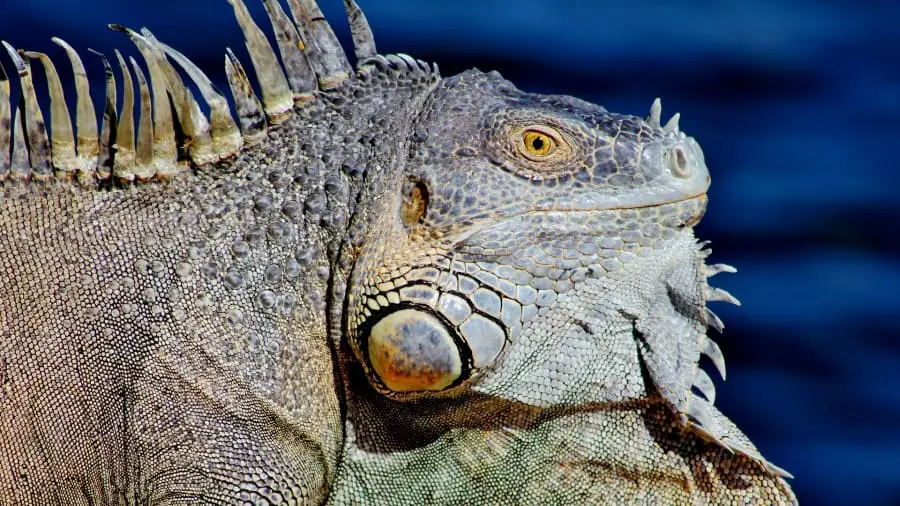
There are many animals in the wild that hibernate when it gets cold. It is quite common for people to ask if iguanas hibernate as well. I have been owning an iguana for many years now. Having been through all sorts of seasons and temperatures with my iguana, I have the answer for you.
Iguanas do not hibernate in any season, in the wild nor in captivity. These tropical reptiles only need a good night of rest every day. However, during wintertime, iguanas will be more lethargic and the low temperatures could freeze them up.
There are many reptiles that hibernate but it should never be associated with iguanas. So, what do iguanas do during wintertime?
Iguanas’ Activities During Winter
Wintertime is one of the iguanas’ worst enemies. They do not do very well during this time. When it is cold, their metabolism rate will drop significantly and so will their energy level.
When comparing iguanas’ activities during the wintertime and summertime, they do not change very much. Tropical iguanas such as the green iguanas will spend most of their time on top of tree branches.
Other than that, they also go basking under the sun and look for food. However, when it is cold, iguanas will not move around as much compared to summertime.
They will also have less appetite because of the drop in metabolism. Also, it is normal for iguanas to feel more lethargic when it is cold.
They are likely going to sleep more. If it gets too cold, iguanas can freeze up and drop from tree branches.
Temperature That Freezes Iguanas
When the temperature hits 39°F or lower, iguanas tend to freeze up. Most of the time, this will not kill the iguana but it is still not good for them.
They are not dead when they freeze up, they just need to be slowly rewarmed to get back to normal. That’s why sometimes you see solid iguanas falling from trees.
This usually happens when they are sleeping at night where the temperature is much lower. When they freeze up, they lose grip on the tree branches, hence falling down.
Iguanas can fall up to 50 feet without getting hurt. So, it’s not likely that they get injured from falling off tree branches.
Letting Iguanas Hibernate: Good or Bad?
As I said, there is no need for iguanas to hibernate neither in the wild nor in captivity. For them to hibernate, you will need constant low temperatures.
Low temperatures will weaken iguanas’ immune system and if you are not careful, your iguana can get hypothermia. If you own a pet iguana, you should never let it hibernate in any circumstances.
It is just way too risky letting iguanas hibernate and there is no reason to take the risk. Just make sure it sleeps well during the night with the proper temperature in their enclosure.
Hypothermia In Iguanas
When iguanas are exposed to cold temperatures for a prolonged period of time, they can get hypothermia. Here are some signs that iguanas might have hypothermia.
Turning Black
When iguanas are cold, they tend to turn black. They do this to try and absorb more heat when basking. However, when these reptiles are in dark places, they usually get lighter in color.
Therefore, even if your iguana has hypothermia, they could still have light skin color if the surrounding is dark.
Unresponsive Iguana
If you notice your iguana is not responding much to your touch or handling, it could be a sign of hypothermia. Other than that, the iguana will also very very cold to the touch.
Stiff & Numb Body
Iguanas with hypothermia will also stiffen up and have a numb body. There will be little to no pain reaction at all.
The reaction will be similar to when you press your thumbnail deeply into the sole of your foot. You won’t feel much, that is what the iguanas feel when it is extremely cold.
Treating Hypothermia In Iguanas
If for any reason your iguana has hypothermia, you need to know how to treat it properly. Here are some recommended steps to follow.
Steps for Treating Hypothermia In Iguanas:
1. First, get some lukewarm water (about 70°F) into a spray bottle and mist your iguana. You do not want to immediately put it in a tub of water immediately. The drastic change in temperature isn’t good for iguanas.
2. After misting the iguana with lukewarm water for a few minutes, prepare a tub of lukewarm water (about 70°F). Soak the iguana into the water for about 20 to 30 minutes.
- At this point, the iguana might still be frozen and not able to move. So, make sure you keep the nostrils above the water so it can breathe.
3. After soaking for 20 to 30 minutes, dry your iguana off with a towel that is at least warm. If you do not dry your iguana off, it will be counterproductive. The water on its body will cool the iguana’s body down which makes the warming process less effective.
4. Once your iguana is dried off, wrap it with a dry towel that is warm. At this point, you can put it on human heating pads or under its basking spot. Make sure not to bask your iguana at normal temperatures yet, it will be too hot at this moment. Start slow and gradually increase the temperature of the basking spot. Do this over the next hour or two till it gets back to normal, preferred temperature. Again, make sure there are no drastic temperature changes.
5. After it is properly rewarmed, give your iguana some water. A syringe or eyedropper might be needed. It might not be willing to drink on its own or it could still be too weak to do so. Make sure you go slow when forcing liquid down your iguana. Forcing too much water, too quickly down an iguana might get water into its lungs.
6. Most iguanas will have no problem recovering from hypothermia if it is treated early on. They should get back to normal day to day routine within 24 hours or so. It is also normal for some iguanas to be quieter for a few days after recovering from hypothermia. So, don’t worry if your iguana seems inactive right after coming out of hypothermia.
Conclusion
There is no need and no reason for iguanas to hibernate at any time. During winter, iguanas might get more lethargic and go to sleep more often but they are not hibernating.
Extremely low temperatures can freeze up iguanas. They could also get hypothermia if they are exposed to cold temperatures for a prolonged period of time. Hypothermia in iguanas is easily treated if it is done so early on.


